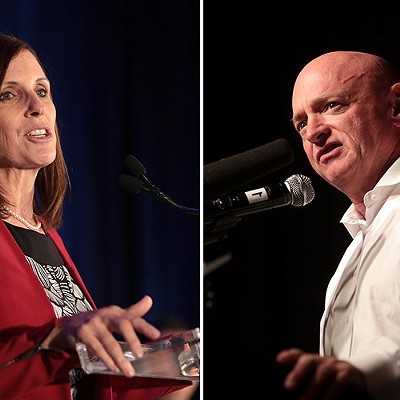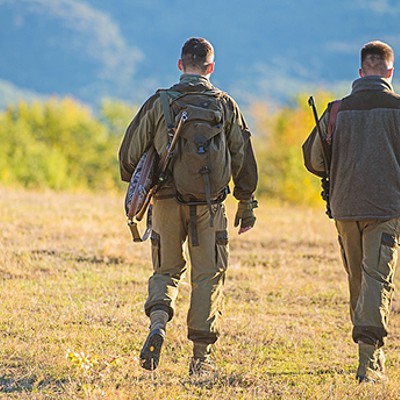At the same time, the Arizona Senate went the extra mile towards squelching direct democracy. In a 16-13 vote on March 30, the Senate passed a bill asking voters to require a two-thirds (or 67 percent) public vote for any wildlife initiative to become law. Now the issue will appear on the November ballot as a referendum. If passed, it would be amended into the state constitution.
Referendum critics call it a blatant attempt by Arizona's big game hunting industry to block efforts by environmentalists. Proponents say it keeps silly wildlife initiatives -- such as 1994's successful trapping ban -- from passing at the ballot box.
Fighting for the supermajority referendum got down and dirty, with a nasty e-mail sent by Game and Fish Commissioner Bill Berlat to one lawmaker who opposed the measure. And Suzanne Gilstrap, wife of AGF Commission Chairman Hays Gilstrap, worked as a paid lobbyist to push the referendum through both houses.
Of Tucson's senators, only Keith Bee voted for the supermajority measure. He didn't return several telephone calls seeking comment.
Concerning the Byzantine journey of Arizona's tortured hunting contest ban: on March 17, AGF commissioners voted to rework the proposal, and resubmit it to the Governor's Regulatory Review Council. As its name implies, the council reviews rules proposed by various state agencies before they can be adopted.
For commissioners, it was a romp through familiar turf. They'd voted to submit the proposal only last September, after plenty of legwork by AGF staffers. As it stood, the measure would have banned contests such as Predator Hunt Extreme. This competition offers $10,000 for those who bag the most foxes, bobcats, coyotes and mountain lions within a set period. Up to six similar contests are held throughout the state.
The commission's decision came on the heels of a lengthy AGF report citing public outrage over the contests, and reporting high manpower costs for handling citizens' complaints. Of 13,856 comments received by AGF, 12,875 supported a complete ban on the contests. Some 37 percent of those supporting the ban were Arizona hunting license holders.
That proposal was later rejected by the Review Council, in what was an anomaly; out of 830 rules brought before it since July, the body had only overturned one, and had rejected none the preceding year. Justifying its stance, the council cited insufficient analysis of the economic impact on small communities hosting such hunts.
In a following interview with the Tucson Weekly, AFG Commission Chairman Gilstrap professed "shock" and "disappointment" over the council's decision. But his sentiment was surprising, since the chairman had originally voted against the ban.
However, during the commission's latest meeting, Gilstrap did another flip-flop, voting to resubmit the proposal with what he calls "some minor revisions."
Donna Markley, a rulewriter for AGF, spells out those revisions. They include revisiting the cost impact on towns hosting the hunts; whether a ban's benefits would outweigh those costs; whether the department has the statutory authority to even institute a ban; and spelling out why the hunting contests should be halted, when similar contests, such as fishing competitions, would remain legal.
According to council chairman Tim Boncoskey, AFG has to go far beyond minor revisions to satisfy him. "Game and Fish is supposed to manage wildlife," he says. "They're supposed to use biological reasoning, and all this stuff that they tout. When they get up there and testify that this rule is going to have no management responsibilities, and that the underlying law -- that anybody in the state can shoot a coyote or a predator....What are they trying to regulate? They are so far away from their statutory responsibility to take care of wildlife it's not even funny. They're totally out of bounds.
"If wildlife advocates want to ban a social behavior," he continues, "the place is not in rules. The place is in law.... I think (AGF) needs to go before the legislature and get statutory authority. Period."
Still, "I'll leave the door open (for AFG) if they come up with something very creative, which I don't think those guys can," Boncoskey says.
At the same time, some suggest that the council is reacting to pressure from Gov. Hull, whose environmental policies "are worse than those of (former) Gov. Symington," according to Sandy Bahr, legislative watchdog for the Sierra Club. "Half the time when she talks about wildlife, she even gets her facts wrong. She often doesn't even know what she's talking about."
Gov. Hull's wildlife philosophy is obviously by proxy, given those she's appointed to the AFG Commission: of the current board's five members, Hull directly appointed Gilstrap, and reappointed Berlat (though he has yet to be confirmed).
Along with Commissioner Mike Golightly, both Berlat and Gilstrap belong to Safari Club International, whose members have been cited for illegal hunting practices, including the trophy killings of endangered species.
Boncoskey denies that Hull pressured his council to reject the hunting ban proposal. Hull spokeswoman Francie Noyes calls the council an "independent body." She says council members "make their own decisions," free from outside arm-twisting.
Others close to the hunting community suggest that commissioners moved to resubmit the proposal, knowing full well that it has no chance of getting past Boncoskey's council. That would take public heat off the commissioners, and satisfy Berlat and Gilstrap's alleged desire to kill the ban for good.
Requesting anonymity, the source also says that Hays Gilstrap covered his bet with the help of his lobbyist wife. "I was told that Suzanne Gilstrap approached (the Review Council) and asked them to re-look at certain areas that Hays didn't feel the commission adequately addressed. I'm told on very good authority that she went to do that, on Hays' authority."
Suzanne Gilstrap strongly denies the allegation, calling it "an absolutely incorrect statement. I have never, in my history as a lobbyist, had any contact with (the Review Council) on any issue, including the predator hunting contest rule. I can't even tell you who members of (the council) are."
Boncoskey says he doesn't know who Suzanne Gilstrap is, either.
By contrast, Commissioner Bill Berlat's shenanigans are well known to many. In his aforementioned e-mail to supermajority opponent Rep. Kathleen Dunbar last winter, Berlat accused her of siding with "animal rights extremists." Berlat also threatened to mobilize sportsmen to oppose her plans for seeking a Senate seat.
Since then, Berlat has apologized to the lawmaker, but "not very convincingly," she says. "It seemed like someone had put him up to it." She reports rumors that the commissioner was acting on orders from the governor's office.
According to Noyes, the governor's office "did talk to him. I don't think 'acting on orders' is at all the appropriate thing. The fact is that there was a conversation about what's appropriate and not appropriate. And (Berlat) decided on his own that an apology was appropriate. We said, 'Yes, you're right. That is the appropriate thing.' "
Berlat says he did apologize -- without pressure from anyone. At the same time, the commissioner's proclivity for noxious e-mail is growing legendary: The Weekly recently received copies of jokes electronically transmitted by Berlat to AFG staffers and other government officials. The gritty jokes seem determined to offend nearly everyone, from Poles and Chinese to women.
One refers to a letter from a Polish son to his mother: "I am writing this letter slow because I know you can't read fast," it begins. Another contains terms and translations necessary "when frequenting a Chinese restaurant." They include such gems as "Chow Mai Dong -- Blow Me," "Fat Ho -- An unattractive woman," and "Ar U Wun Tu -- A gay liberation meeting."
Another cites "Old Chinese Proverbs: Virginity like bubble, one prick all gone," and "To meet girl in park is good...To park meat in girl is better."
One characterized an Arab as "wretched."
"I don't know if they were appropriate or not appropriate," Berlat says when asked about the e-mails. "I thought they were funny, and sent them around to some of my friends. I stopped doing that because I was told not to e-mail people in the (AGF) department, because they're not supposed to be looking at that kind of stuff on (department) time."
Noyes says Berlat's online jokes were also part of her office's discussions with him. "The governor certainly believes that if you're going to be using state computers and acting with state employees, that you do so appropriately."
Apparently, the commissioner has a little too much free time on his hands. Still, he again gave The Weekly a green light for ongoing coverage of his exploits. As loyal readers will recall, last month Berlat told a Weekly reporter that, "As far as I'm concerned, write the shit that you want for that rag."
This time his thumbs-up was similarly brief, but likewise appreciated. "I know you're going to have a field day with the rest of the bullshit that you're trying to do," the commish says.
Fortunately for us, in the vast field of journalism, some cowpies are just deeper than others.












